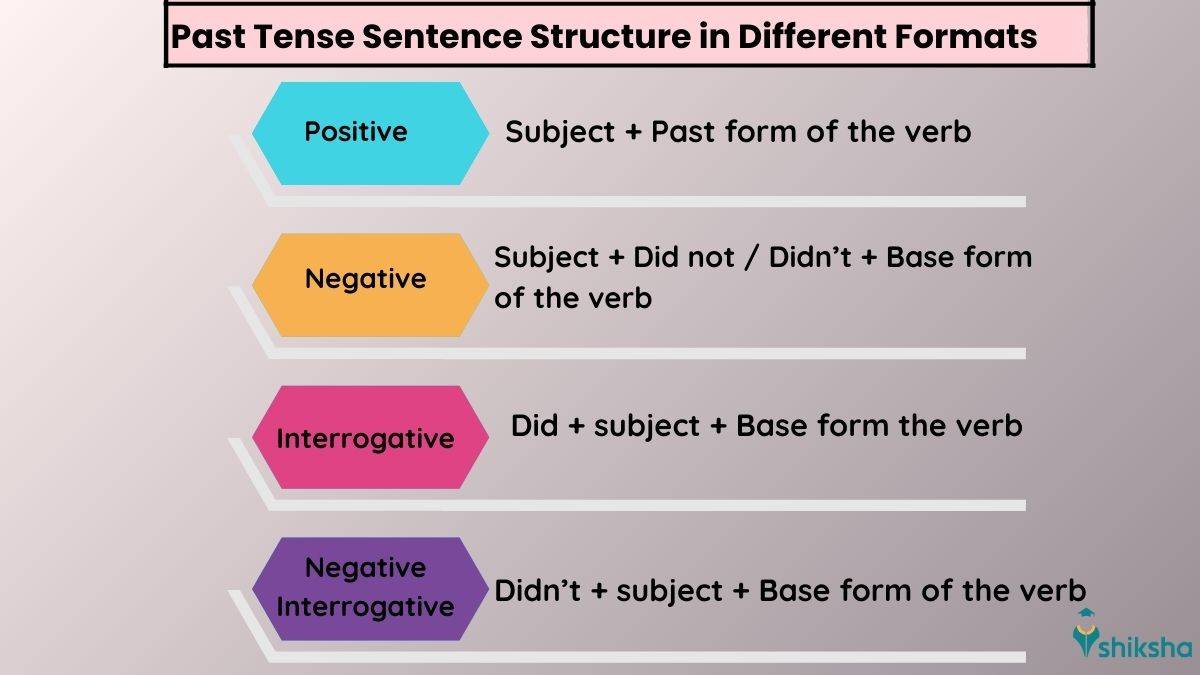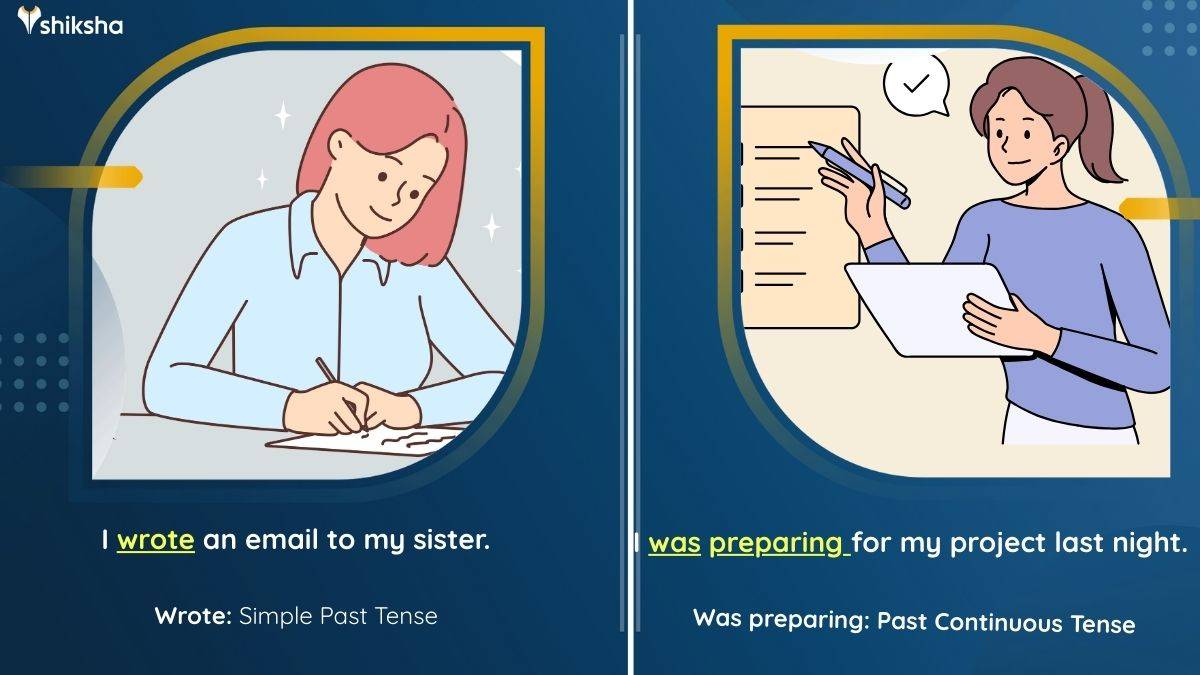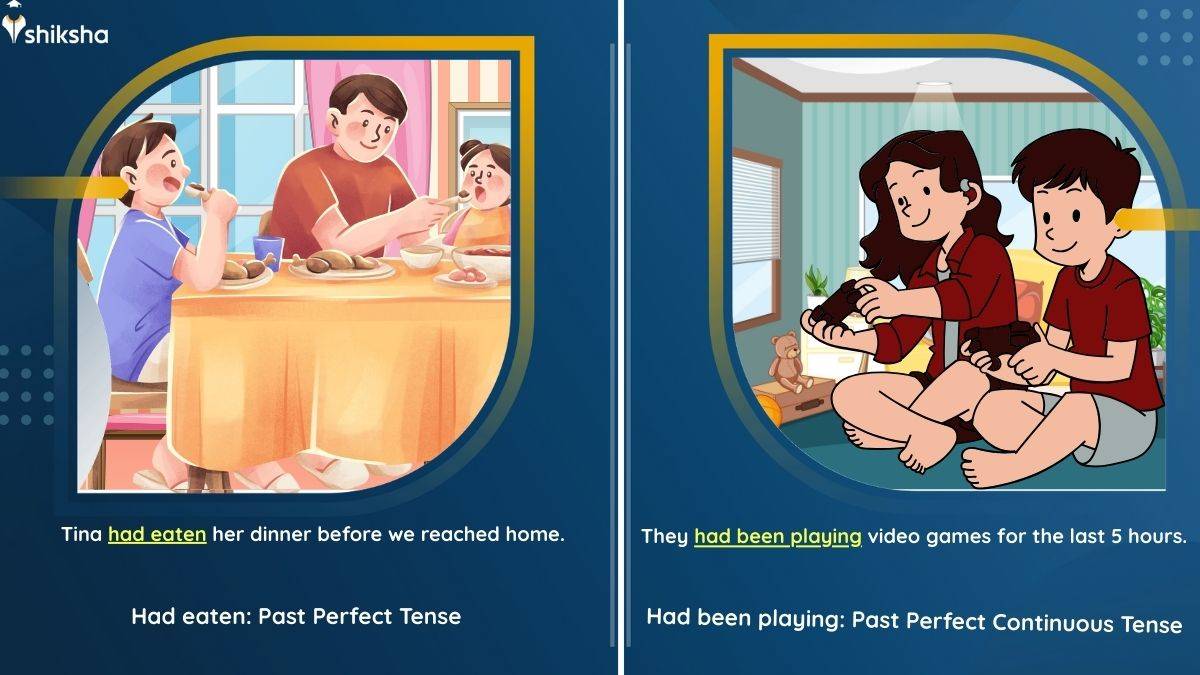
Tenses are one of the most fundamental components of English Grammar. The Past Tense is a tense that specifies an event or action that has taken place in the past. A few of the verbs in the Past Tense in English include went, reached, sank, danced, etc. There are four main types of Past Tense in English, namely Simple Past Tense, Past Continuous, Past Perfect, and Past Perfect Continuous.
Using these forms of tenses in English in daily life helps make the meaning of a particular action clear, describe stories accurately, and tell about the proper timing of events. Additionally, the questions on the Past Tenses topic are included in a number of entrance exams like CUET, CAT, IPMAT, etc. The questions about the Past Tenses are also included in the standardized English proficiency exams like TOEFL and IELTS. Check this comprehensive guide on Past Tenses in English grammar to know about its rules, types, importance, practice questions, etc.
- What is Past Tense?
- Definition of Past Tense
- Types of Past Tenses
- List of Past Tense Verbs
- Rules for Past Tenses
- Significance of Past Tenses in English
- Difference between Past Tense and Present Tense
- Common Mistakes to Avoid in Past Tenses
- Past Tense Examples
- Tips to Learn Past Tenses in English
- Best Books to Study Past Tenses
- Past Tense in English Grammar Exercises
What is Past Tense?
The Past Tense is a grammatical tense that can be used to talk about or represent any action or event that has happened in the past. In other words, the Past tense is a form of the verb that indicates an action that has already occurred before talking or writing about the same. It is one of the main types of Tenses in English Grammar and is used for:
- Actions or events that have already taken place
- Past states, situations or feelings
- Habits or routines in the past
- Narration of events or past stories
There are four types of past tense forms: Simple Past, Past Continuous Tense, Past Perfect Tense, and Past Perfect Continuous Tense.
Also Read:
Definition of Past Tense
According to Oxford’s Dictionary, the Past Tense in English is – “the form of the verb used to describe actions in the past”
Pronunciation: /pæst ˈtens/
Past Tense Example: She ate her lunch already (An Action i.e. eating lunch has already happened. Here, Ate is the past tense of the verb “eat”
Past Tense Definition According to Macmillan Dictionary
Macmillan Dictionary describes ‘Past Tense’ as “the form of the verb groups indicating that an action or event happened regularly, or that a situation existed or was true during a period before now.”
Types of Past Tenses
There are four types of Past Tenses in English Grammar. These four types indicate the varied nature of actions that have happened in the past. Given below are the details of these types:
Simple Past Tense: It is used to talk about a completed action or event that has happened in the past. Given below are some of the Simple Past Tense examples:
- He visited his grandmother in the morning
- My mother lived in Kolkata for three years
- They went to the market in the evening
- I wrote an email to my sister
Past Continuous Tense: It is used to depict an event or action that was continuing in the past. Some of the examples are given below:
- They were exploring the mall all day
- I was preparing my project last night
- Chetna was driving when it started to rain
- She was solving a challenging puzzle
Past Perfect Tense: These represent an action that was completed before another past action. Here are a few of examples of the Past Perfect Tense:
- Rashi had visited Jaipur many times before she moved there
- By the time they arrived at the theater, the movie had already started
- Tina had eaten her dinner before we reached home
- I had fallen asleep before 9 pm yesterday
Past Perfect Continuous Tense: These depict an action or event that started in the past, continued for some time, and ended before another action in the past. Given below are some of its examples:
- He had been studying Spanish before he finished college
- I had been working at this company for five years when I got the promotion
- She had been shopping with her elder sister at the fair since morning
- Claire had been watching TV for hours before she slept
List of Past Tense Verbs
The following table specifies the past tense verbs with their past / past participle forms.
| Base Verb |
Past Form |
Past Participle Form |
|---|---|---|
| Reach |
Reached |
Reached |
| Be |
Was / were |
Been |
| Begin |
Began |
Begun |
| Bet |
Bet |
Bet |
| Blow |
Blew |
Blown |
| Break |
Broke |
Broken |
| Choose |
Chose |
Chosen |
| Build |
Built |
Built |
| Sing |
Sang |
Sung |
| Teach |
Taught |
Taught |
| Throw |
Threw |
Thrown |
| Dance |
Danced |
Danced |
| Drink |
Drank |
Drunk |
| Eat |
Ate |
Eaten |
| Forgive |
Forgot |
Forgotten |
Rules for Past Tenses
There are some rules that are followed in the Past Tenses. It is important to understand these rules as they would help in identifying the past tenses and creating sentences regarding the same. Given below are the rules:
| Type of Past Tense |
Usage |
Structure |
|---|---|---|
| Simple Past Tense |
Describes the completed actions happened in the past |
Subject + Past Form of the Verb |
| Past Continuous |
Describes the actions in progress at a particular time in the past |
Subject + Was / Were + verb-ing |
| Past Perfect |
Describes the action completed before another past action |
Subject + had + past participle |
| Past Perfect Continuous |
This shows the ongoing past action that continued up to another point in the past |
Subject + had been + verb-ing |
Also Read:
Also, note that there are Past Tenses sentences that are negative, interrogative and negative interrogative in nature. So, the structure for these Types of Past Tenses would be as follows:

Significance of Past Tenses in English
Usage of Past Tenses in English Grammar is crucial because they help in expressing clearly about the past events and adding clarity to communication. Additionally, they are important from the storytelling point of view. The points given below specifies can be referred to know the importance of Past Tense:
- Main component of storytelling: Past Tenses are used while sharing the stories, personal experiences and history
- Describes about past events: Past Tenses help one to narrate stories, share experiences or tell about the events that have happened in the past in a clear manner
- Necessary for building a grammar foundation: Knowing the concept of Past Tenses strengthens the overall grammar. In all, using Past Tenses in daily life improves writing, speaking, and comprehension skills
- Used in formal writing and exams: Past Tenses are essential in professional, academic, and creative writing. Additionally, the questions on these tenses are tested in English exams like IELTS, TOEFL, etc.
- Helps to be fluent: Using Past Tenses helps one sound more clearer, natural and confident in the conversations
Also Read:
| Subject Verb Agreement Questions and Answers | Articles: Meaning, Examples and Exercises with Answers |
Difference between Past Tense and Present Tense
The basic difference between Past Tenses and Present Tenses is about the time when an action takes place. Present Tense describes the actions or events that are happening now (in the present time). They also tell about the habits, current states, or general truths. On the other hand, the Past Tenses describe events or actions that happened in the past.
| Particulars |
Present Tense |
Past Tense |
|---|---|---|
| What they describe |
|
|
| Examples |
|
|
Also Read:
| Nouns: Exercises and Answers | Antonyms: Exercises and Answers | Conjunctions: Exercises and Answers |
Common Mistakes to Avoid in Past Tenses
Past Tense Examples
Tips to Learn Past Tenses in English
Best Books to Study Past Tenses
Past Tense in English Grammar Exercises
English Tenses Exam
Student Forum
Other Topics under this Chapter
Other Class 10th English Chapters
- English Past Tense
- English Idioms
- English Punctuation
- English Analogy
- English Interjections
- English Prefixes
- English Adjectives
- English Future Continuous Tense
- English Letter Writing
- English Suffix
- English Grammar
- English One Word Substitution
- English Mood
- English Direct and Indirect Speech
- English Figures of Speech
- English Composition
- English Para Jumbles
- English Reading Comprehension
- English Sentences
- English Auxiliary and Modal Verbs
- English Formation of Words
- English Precis Writing
- English Nouns
- English Adverbs
- Conjunctions
- English Prepositions
- English Verbs
- English Paraphrasing
- English Articles
- English Subject and Predicate
- English Pronouns
- English Tenses
- English Active and Passive Voice
- English Vocabulary
- English Subject Verb Agreement
- English Phrases
- English Synonyms
- English Etymology and Roots
- English Spelling Rules
- English Parts of Speech
- English Gerunds



What is the structure of Present Perfect Tense and its rules?